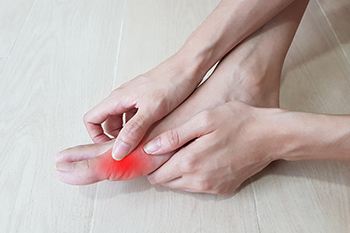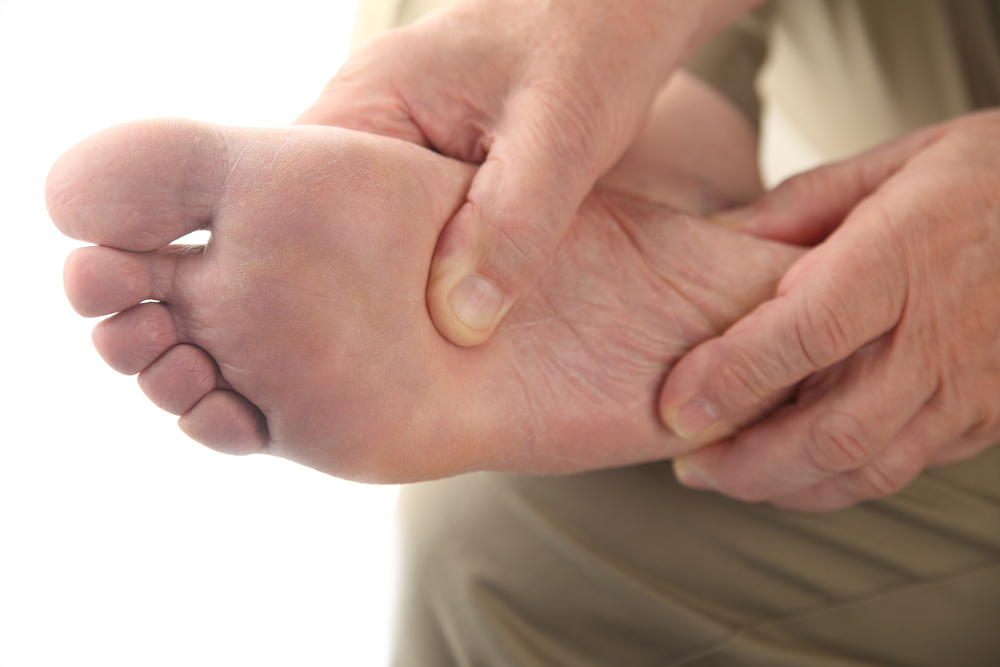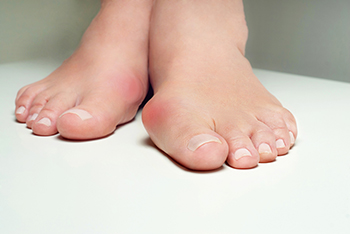Connect With Us
Blog
Items filtered by date: December 2023
How Gout Differs From Rheumatoid Arthritis

Gout and rheumatoid arthritis, also known as RA, are two distinct medical conditions that can affect joints in the feet and ankles, and they can be differentiated based on various factors. Gout is caused by the accumulation of uric acid crystals in the joints, usually due to an overproduction or under-excretion of uric acid. In contrast, RA is an autoimmune disease where the body's immune system mistakenly attacks its own joints, leading to inflammation. The symptoms of gout and RA also vary. Gout typically presents with sudden and intense pain in one joint, often the big toe, along with redness and swelling. RA, on the other hand, typically affects multiple joints symmetrically and causes chronic pain, morning stiffness, and joint deformities over time. Laboratory tests can help distinguish between the two conditions. Elevated levels of uric acid in the blood or the presence of uric acid crystals in joint fluid are indicative of gout. RA is characterized by the presence of specific auto-antibodies, like rheumatoid factor and anti-cyclic citrullinated peptide antibodies. If you have pain in your foot or ankle joints, it is suggested that you schedule an appointment with a podiatrist for proper testing and a diagnosis so that the right treatment can be administered.
Gout is a foot condition that requires certain treatment and care. If you are seeking treatment, contact one of our doctors from New Jersey and New York. Our doctors will treat your foot and ankle needs.
What Is Gout?
Gout is a type of arthritis caused by a buildup of uric acid in the bloodstream. It often develops in the foot, especially the big toe area, although it can manifest in other parts of the body as well. Gout can make walking and standing very painful and is especially common in diabetics and the obese.
People typically get gout because of a poor diet. Genetic predisposition is also a factor. The children of parents who have had gout frequently have a chance of developing it themselves.
Gout can easily be identified by redness and inflammation of the big toe and the surrounding areas of the foot. Other symptoms include extreme fatigue, joint pain, and running high fevers. Sometimes corticosteroid drugs can be prescribed to treat gout, but the best way to combat this disease is to get more exercise and eat a better diet.
If you have any questions please feel free to contact our offices located in Little Silver, NJ and New York, NY . We offer the newest diagnostic and treatment technologies for all your foot and ankle needs.
We Can Treat Your Foot or Ankle Pain
Indicators of Diabetic Foot Problems

Diabetic feet are prone to various problems due to the impact it can have on blood circulation and nerve function. It is essential for individuals with diabetes to be aware of these signs and symptoms to prevent complications. One common issue is neuropathy, which can lead to loss of sensation in the feet. This means you may not feel pain, heat, or cold as well as you should, and may experience tingling or numbness. Peripheral artery disease, or PAD, is another concern, reducing blood flow to the feet and resulting in cramping, pain, or slow healing sores. Diabetic ulcers are slow healing wounds that can develop due to nerve damage and poor circulation. It is helpful to be aware of any open sores or blisters on your feet. If you have diabetes and notice changes in your feet, it is strongly suggested that you schedule an appointment with a podiatrist to have a thorough examination and treatment that may help to avoid serious foot problems.
Diabetic foot care is important in preventing foot ailments such as ulcers. If you are suffering from diabetes or have any other concerns about your feet, contact one of our doctors from New Jersey and New York. Our doctors can provide the care you need to keep you pain-free and on your feet.
Diabetic Foot Care
Diabetes affects millions of people every year. The condition can damage blood vessels in many parts of the body, especially the feet. Because of this, taking care of your feet is essential if you have diabetes, and having a podiatrist help monitor your foot health is highly recommended.
The Importance of Caring for Your Feet
- Routinely inspect your feet for bruises or sores.
- Wear socks that fit your feet comfortably.
- Wear comfortable shoes that provide adequate support.
Patients with diabetes should have their doctor monitor their blood levels, as blood sugar levels play such a huge role in diabetic care. Monitoring these levels on a regular basis is highly advised.
It is always best to inform your healthcare professional of any concerns you may have regarding your feet, especially for diabetic patients. Early treatment and routine foot examinations are keys to maintaining proper health, especially because severe complications can arise if proper treatment is not applied.
If you have any questions, please feel free to contact our offices located in Little Silver, NJ and New York, NY . We offer the newest diagnostic and treatment technologies for all your foot care needs.
Understanding the Definition and Causes of a Bunion

A bunion, a common foot deformity, is characterized by the gradual misalignment of the big toe joint, causing a bony protrusion on the side of the foot. This condition develops when the big toe consistently pushes against the next toe, gradually altering the joint's structure. Wearing ill-fitting footwear, particularly tight shoes or high heels, is a primary culprit, as they force the toes into unnatural positions. Genetic factors also play a role, with some individuals inheriting a predisposition to bunions. Foot mechanics, such as overpronation or flat feet, contribute to the misalignment, increasing the risk. Arthritis, particularly inflammatory types, may exacerbate bunion formation. Additionally, trauma or injury to the foot can accelerate the development of bunions. Recognizing the multifaceted causes of bunions is important for preventive measures. If you have developed a bunion, it is suggested that you schedule an appointment with a podiatrist who can offer you effective relief techniques.
If you are suffering from bunions, contact one of our doctors of New Jersey and New York. Our doctors can provide the care you need to keep you pain-free and on your feet.
What Is a Bunion?
A bunion is formed of swollen tissue or an enlargement of boney growth, usually located at the base joint of the toe that connects to the foot. The swelling occurs due to the bones in the big toe shifting inward, which impacts the other toes of the foot. This causes the area around the base of the big toe to become inflamed and painful.
Why Do Bunions Form?
Genetics – Susceptibility to bunions are often hereditary
Stress on the feet – Poorly fitted and uncomfortable footwear that places stress on feet, such as heels, can worsen existing bunions
How Are Bunions Diagnosed?
Doctors often perform two tests – blood tests and x-rays – when trying to diagnose bunions, especially in the early stages of development. Blood tests help determine if the foot pain is being caused by something else, such as arthritis, while x-rays provide a clear picture of your bone structure to your doctor.
How Are Bunions Treated?
- Refrain from wearing heels or similar shoes that cause discomfort
- Select wider shoes that can provide more comfort and reduce pain
- Anti-inflammatory and pain management drugs
- Orthotics or foot inserts
- Surgery
If you have any questions, please feel free to contact our offices located in Little Silver, NJ and New York, NY . We offer the newest diagnostic and treatment technologies for all your foot care needs.

